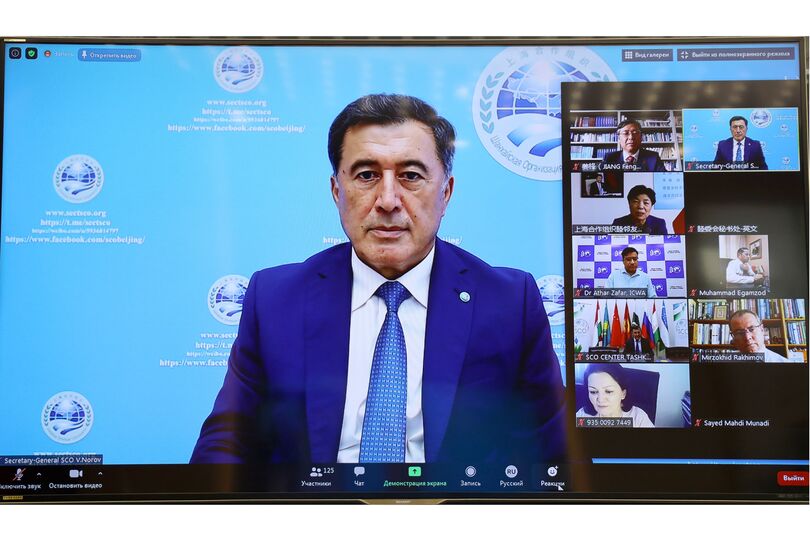On 11 August 2020, the SCO Secretariat, the SCO Chinese Committee on Good-Neighbourliness, Friendship and Cooperation (SCO DNFCC) and the Shanghai Academy of Global Governance and Area Studies (SAGGAS) held a joint videoconference, "The impact of the coronavirus pandemic on cooperation within the SCO: Challenges and opportunities. The role of public diplomacy in promoting cooperation within the SCO."
SCO Secretary-General Vladimir Norov and Chair of the China Committee on Good-Neighbourliness, Friendship and Cooperation Cui Li were the main speakers.
Taking part in the event were more than 100 participants, including representatives of public organisations and institutions of the SCO member states, observer states and dialogue partners in the area of public diplomacy, as well as the SCO member states' permanent representatives at the SCO Secretariat, employees of analytical centres and the media.
The conference was moderated by SAGGAS Executive Director Yang Cheng.
Mr Norov noted that the COVID-19 pandemic caused a large socioeconomic crisis in many countries, escalated political tensions between major powers and greatly affected the everyday lives of millions of people. Threats and challenges to global and regional security, including those related to information security and countering of bioterrorism, have also become more acute.
The SCO Secretary-General believes that the virus has clearly shown how deep the connections between countries are, which determines the need to promote mutual trust, develop together and achieve common benefits by overcoming political differences and renouncing populist ideas and protectionism.
The Secretary-General noted the fruitful character of the SCO member countries' cooperation in countering the pandemic, commitment to the philosophy of open development and building a community based on shared responsibility. The SCO Member States not only shared their experience in countering the coronavirus, but also provided each other with financial and humanitarian aid, were involved in efforts to develop a vaccine and sent specialists to countries and regions worst hit by the disease.
Mr Norov stressed that the coronavirus pandemic gave rise to new challenges and threats but also created new opportunities and prospects. In this sense, he believes it is especially important to analyse the accumulated experience of cooperating during emergencies within the SCO, in particular, positive factors of cooperation, solidarity and moral and material support between representatives of different social strata, businesses, cultural and academic communities and youth in the SCO space. All of this shows the great potential of public diplomacy within the SCO. According to the SCO Development Strategy until 2025, the SCO member states will promote the development of cultural and humanitarian contacts between nongovernmental organisations, non-profit associations and people living in the member states, as well as the development of inter-civilisational dialogue involving SCO observer states and dialogue partners. The SCO's rich cultural potential and its diverse ethnic and religious groups are a key factor in the development of public diplomacy within the SCO. In this context, Mr Norov noted that the "SCO family" included 18 states with the population of over three billion people representing almost 200 ethnic groups, which made the SCO the most ethnically diverse organisation in the world after the UN.
The SCO Secretariat makes efforts to strengthen friendly contacts between the SCO members. Various events aimed at bringing cultures closer and developing a dialogue of civilisations are held as part of the SCO — Our Common Home all-embracing cultural project. The SCO is a unique platform where multilateral projects in almost all spheres of human activity are implemented.
The Secretary-General stressed that, considering the new reality, the effective implementation of the public diplomacy's potential and promotion of the social
base of neighbourliness, friendship and cooperation between the SCO nations deserved attention and analysis. Moreover, the SCO believes it important to develop a specific document, a concept or a provision on cooperation between public diplomacy centres and friendship societies with foreign countries in order to establish more meaningful, content-rich and system-wide cooperation within the SCO, such as an assembly of SCO nations.
In conclusion, Mr Norov stated that the SCO potential would become more in-demand and serve as an example of how mutually beneficial cooperation in all the key areas could be established in a complicated and quickly changing world.
Chair of the SCO Chinese Committee on Good-Neighbourliness, Friendship and Cooperation Cui Li highlighted the importance of public diplomacy for strengthening mutual trust and cooperation between the member states. Above all, this became clear during the coronavirus pandemic when the member states united against the new threat.
She also noted how important it was to promote contacts between business and academic communities, the media, women and youth within the SCO. She used the implementation of such projects as the Eight Wonders of the SCO, Health Express International Bright Line and the exhibition of children's drawings as successful examples. She believes that these initiatives will promote cultural and tourism exchanges between the SCO member states.
Moreover, she suggested that SCO countries' public associations should take an active part in building a society of "the shared SCO destiny" and promoting regional and international peace and development. She also believes it is necessary to further strengthen international anti-epidemic cooperation. The importance of more active humanitarian exchanges between the SCO member states was emphasised.
Cui Li highlighted the importance of communication technologies. She said that artificial intelligence and the 5G networks provided a lot of support to the international community in countering the epidemic as well as new platforms and opportunities for cooperation between the SCO member states in various areas in new conditions.
The forum participants presented substantive reports and specific proposals to strengthen public diplomacy and cooperation within the SCO in the context of new challenges and opportunities that arose during the coronavirus pandemic.
